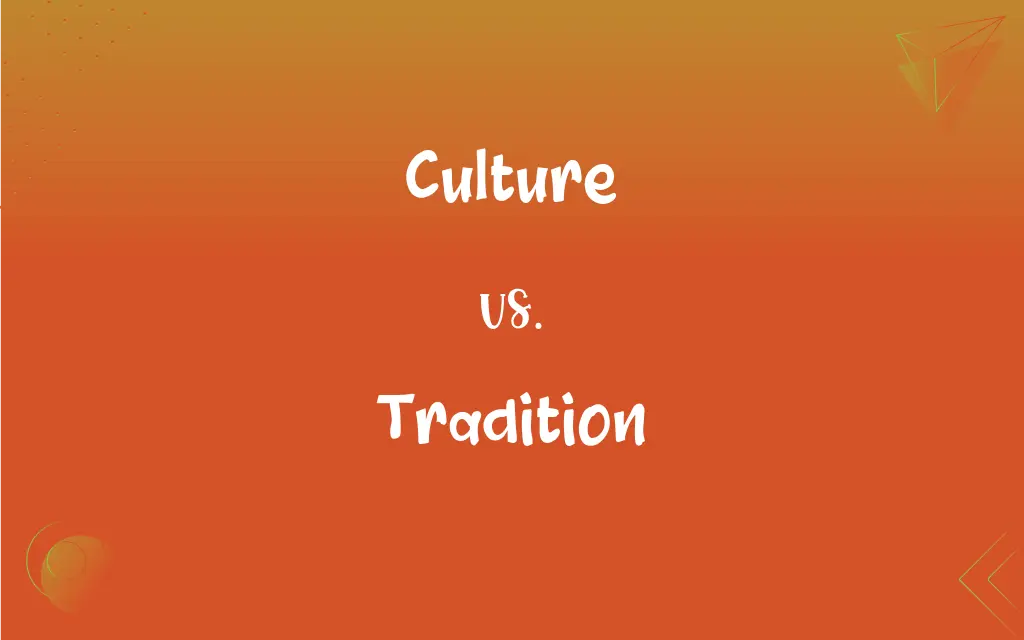Culture vs. Tradition: What's the Difference?
By Harlon Moss || Updated on October 4, 2023
Culture encompasses shared values, beliefs, and practices of a group; tradition refers to specific practices or customs passed down over time.

Key Differences
Culture and tradition are intertwined terms, yet distinct. Culture is the broad umbrella that entails the shared practices, beliefs, values, customs, and behaviors that characterize a group of people or society. Tradition, in contrast, pinpoints to specific practices, rituals, or customs passed down through generations within that culture.
While culture reflects the comprehensive lifestyle and shared experiences of a society, tradition zeroes in on the long-standing practices or customs that have been handed down. A culture can encompass various traditions, but a tradition is a singular practice or belief within that broader cultural context.
Culture, as a concept, can evolve, change, and adapt over time. As societies interact, cultures can merge, influence one another, or evolve based on changing societal norms. Tradition, however, is about continuity and preservation, often remaining unchanged as it gets passed from one generation to the next.
A single culture might encompass multiple traditions. For instance, American culture includes traditions from diverse ethnicities and backgrounds. Conversely, a single tradition, like Thanksgiving, is a practice embraced and celebrated within the wider American culture.
Culture provides the backdrop for understanding the behaviors, values, and practices of a society. Tradition offers a window into the practices that have historical or ritualistic significance within that cultural framework.
ADVERTISEMENT
Comparison Chart
Definition
The shared beliefs, values, and practices of a group.
Specific practices or customs passed down over time.
Scope
Broad, encompassing overall lifestyle and societal beliefs.
Narrower, focusing on particular practices within a culture.
Duration and Flexibility
Can evolve and change over time.
Typically long-standing and consistent through generations.
Components
Includes traditions, customs, values, norms, and more.
Singular practices or rituals within a culture.
Function
Provides identity and societal framework.
Preserves historical or ritualistic significance.
ADVERTISEMENT
Culture and Tradition Definitions
Culture
The shared beliefs and practices of a community.
The culture of New Orleans is rich in music and history.
Tradition
A practice passed down through generations.
The tradition of hanging stockings at Christmas is beloved by many.
Culture
Artistic and intellectual achievements.
Renaissance Italy was a pinnacle of cultural achievements.
Tradition
Rituals with historical significance.
The tradition of lighting candles during Hanukkah commemorates a miracle.
Culture
A way of life for a specific group.
Indigenous tribes have their distinct culture and customs.
Tradition
Beliefs or customs maintained over time.
Oral storytelling is a cherished tradition in many cultures.
Culture
An expression of societal values and norms.
The culture of a company greatly influences its work environment.
Tradition
Practices that have continuity and history.
The tradition of wearing something blue at weddings symbolizes purity and love.
Culture
Learned and shared patterns of behavior.
Modern youth culture is heavily influenced by technology.
Tradition
Established customs of a community.
It's a family tradition to gather for a big meal every Sunday.
Culture
The arts, beliefs, customs, institutions, and other products of human work and thought considered as a unit, especially with regard to a particular time or social group
Edwardian culture.
Japanese culture.
Tradition
The passing down of elements of a culture from generation to generation, especially by oral communication
Cultural practices that are preserved by tradition.
Culture
These arts, beliefs, and other products considered with respect to a particular subject or mode of expression
Musical culture.
Oral culture.
Tradition
A mode of thought or behavior followed by a people continuously from generation to generation; a custom or usage
The traditions of Tibetan Buddhism.
Culture
The set of predominating attitudes and behavior that characterize a group or organization
A manager who changed the corporate culture.
Tradition
A set of such customs and usages viewed as a coherent body of precedents influencing the present
Followed family tradition in dress and manners.
Culture
Mental refinement and sophisticated taste resulting from the appreciation of the arts and sciences
A woman of great culture.
Tradition
A precept or a body of precepts that are not written in the sacred book of a religion, such as the Bible, but are considered holy or true.
FAQs
How does culture influence tradition?
Culture provides the overarching framework, and traditions are practices maintained within that framework.
Can a culture exist without traditions?
While a culture includes traditions, it also comprises beliefs, norms, and values.
Are culture and tradition the same?
No, culture is broader encompassing values and beliefs, while tradition is about specific practices within a culture.
Can traditions change over time?
While traditions emphasize continuity, they can evolve or adapt within changing cultural contexts.
How do people contribute to their culture and traditions?
People contribute by practicing, preserving, adapting, and passing down cultural values and traditions.
Why are traditions important in a culture?
Traditions offer historical or ritualistic significance, preserving cultural identity.
How does language relate to culture and tradition?
Language is a component of culture and can carry and preserve traditions through storytelling and rituals.
Do cultures share traditions?
Some traditions might be found in multiple cultures, either through shared history or mutual influence.
Can one culture have multiple traditions?
Yes, a culture often encompasses various traditions from its history or influences.
How do modern societies impact traditions?
Modern societies can lead to adaptations or evolutions in traditions while still maintaining their essence.
Do all members of a culture practice its traditions?
Not necessarily. While traditions are part of culture, individual participation varies.
Can you give an example of a tradition within American culture?
Thanksgiving is a tradition celebrated within the broader American culture.
How are new traditions established within a culture?
New traditions can emerge from significant events, influences, or adaptations of older traditions.
How does globalization impact culture and tradition?
Globalization can lead to cultural blending, influencing or introducing new traditions.
Can traditions be created or only inherited?
Traditions often originate historically, but new practices can become traditions over time.
Why do some traditions fade away?
Traditions can fade due to societal changes, globalization, or lack of practice among newer generations.
Are culture and tradition static or dynamic?
Culture is dynamic and can evolve, while traditions emphasize continuity but can adapt.
How does religion impact culture and tradition?
Religion can be a significant component of culture and source of many traditions.
Can a practice be both cultural and traditional?
Yes, practices can reflect the broader cultural values and also be traditions passed down.
Is every cultural practice a tradition?
No, not every cultural practice qualifies as a tradition. Traditions have a history and continuity.
About Author
Written by
Harlon MossHarlon is a seasoned quality moderator and accomplished content writer for Difference Wiki. An alumnus of the prestigious University of California, he earned his degree in Computer Science. Leveraging his academic background, Harlon brings a meticulous and informed perspective to his work, ensuring content accuracy and excellence.































































